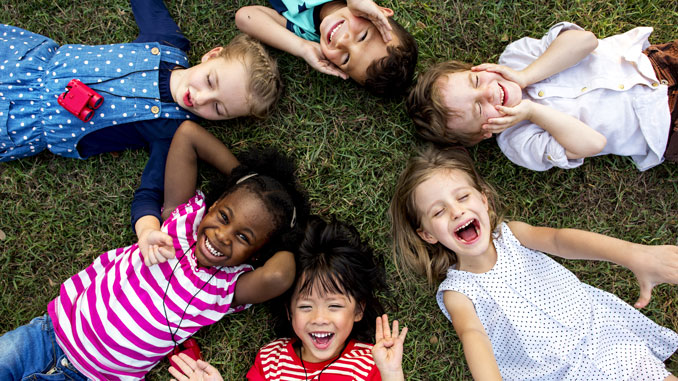
So, your child is entering kindergarten in the fall? That can feel like an overwhelming first step for any parent, especially if this is your first child. It’s hard enough to worry about your little one being gone for many hours of the day—perhaps for the first time—and how they will fare socially, but add in concerns of academic performance and it’s all some parents can do not to have a nervous break down. Take a deep breath. If you’re thinking about these potential issues then you’re already on your way to having a successful kindergartener. The best thing to do is to inform yourself. Find out what San Joaquin County educators say your child should know before entering kindergarten, and start taking steps now to ensure your child is prepared.
Get started.
We’re still nine months out from the start of the next school year, so your child has some time to get ready for kindergarten if they are not there yet. Take steps to ease the transition. Check out our sidebar on the “need to knows” and start practicing these skills with your child now.
One of the biggest parts of being prepared for kindergarten isn’t a single bit of knowledge but rather a mental state. Children who attend preschool before kindergarten tend to have higher success rates academically, socially, and emotionally.
“If a child does not go to preschool before coming in to Kindergarten, I do see them having a disadvantage within the classroom,” says Carrie Fabela. Carrie teaches Kindergarten in the SJCOE school district while pursuing a master’s degree in education at the Teachers College of San Joaquin. “Those that come in having previous exposure and support usually are the students that excel.” And the problem isn’t only that children without preschool experience take longer to catch up, sometimes the struggle continues indefinitely.
Preschool enrollment is often offered year round, which means if your child isn’t currently enrolled there is still time to get some preschool exposure before entering kindergarten. Look for schools with mid-year openings and start small. Children who are not used to being outside of the home and away from a known caregiver may do best with two half days a week, while other preschoolers with a little more practice in independence could handle more days.
In addition to preschool, there are other ways to grow a child’s social and emotional independence. Schedule play dates with neighbors or other children in the same age group, or take your child to a class to provide ample opportunity for them to engage with peers.
If you feel like your child is falling behind in any of these categories, get them caught up now. Perhaps your child is currently a kindergartener but is struggling in the classroom. Carrie suggests putting in extra hours to help children who are falling behind.
In Carrie’s class, alphabet flash cards are a big help, and she’s even sent some home with students before so they can get extra practice. Keep the lines of communication open with your child’s teacher. This gives the teacher the ability to provide support with skills and materials, or even emotional support if the child needs it.
“I believe the biggest key in helping an unprepared student is continuous dialogue between the parent and teacher. There can be many different reasons why a student may come in unprepared so I make sure that I keep the dialogue open with the parent and provide as much support for the family as I can,” Carrie says.
Preparing the whole child.
Let’s go back to the idea that kindergarten readiness is about more than academics. Sure, more is expected of kids today than ever before. Kindergarten now looks more like first grade and less like a fun environment focused on play. But social and emotional development is still a big part of whether or not kids will excel in school.
“It is important for parents to be aware of the social struggles their child may have,” Carrie says. This is something teachers can communicate to parents or that can be observed by volunteering in the classroom. “I see too much screen time with many students and that provides the total opposite support in helping students in social settings.”
Trade television time for social experiences. Take your child to the park to meet other friends and use imaginative play to learn. If your child is interested in a sport, sign up for a team. The more positive social settings you can create for your child, the better equipped they will be to perform in a classroom amongst peers.
Emotional support is also important. Some kids are shy and cling to mom and dad while others find independence with ease. Be a confidant for your child. Open dialogue with a child will always help. Parents can achieve this by asking about their child’s day and having meaningful conversations about friendship with their children.
Carrie says teachers should work these skills into lesson plans, as well. “There needs to be time to share, compromise, and communicate appropriately,” she says. “Giving students the opportunity to do this daily will help students that do struggle.”
A parent’s role.
In addition to getting your kid ready for kindergarten, it is your job as a parent to see them through the experience. If you can, get involved in the classroom. All kids can benefit from parent support at school but those who are struggling may need it even more.
This experience not only brings a second form of support into the classroom for the child, but it gives the parent perspective on how to help the student at home. Knowing what a day in the classroom looks like, seeing how a child behaves in school, and visualizing the techniques and lessons being taught in the classroom are all benefits to the parent.
How do you do this without getting in the way? Ask the teacher if you can observe or volunteer in the classroom for a day or two. Carrie says she works with parents to make this happen. It all goes back to having those lines of communication open.
Sidebar//Read to kids.
Reading is good for more than verbal skills. Studies show that not only are kids who read at home better readers, they perform better in math, as well. This suggests a strong correlation between reading and overall academic performance.
In kindergarten most kids don’t know how to read, or are just learning to. However, parents can strengthen these same skills by reading to kids every night. Reading and conversation create bonds, strengthen verbal skills, and promote healthy parent-child relationships—all of which help kids excel in school.
Literary Statistics
26% of kids who were read to three to four times in the last week recognized all letters of the alphabet
60% of kids who are read to frequently can count to 20 or higher (vs. 44% of those who were not)
54% of kids who are read to frequently can write their own names (vs. 40% of those who were not)
77% of kids who are read to frequently can read or pretend to read (vs. 57% of those who were not)
53% of kids ages three to five were read to by a family member daily
According to the National Center for Education Statistics (NCES)
Sidebar//What kids should know entering kindergarten
Read/write first and last name
Use scissors
Letter recognition (some or most)
Number recognition 1-10
Basic social skills

